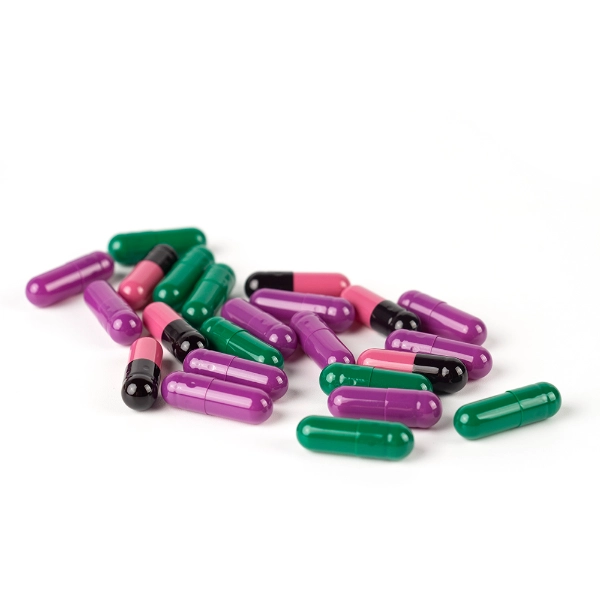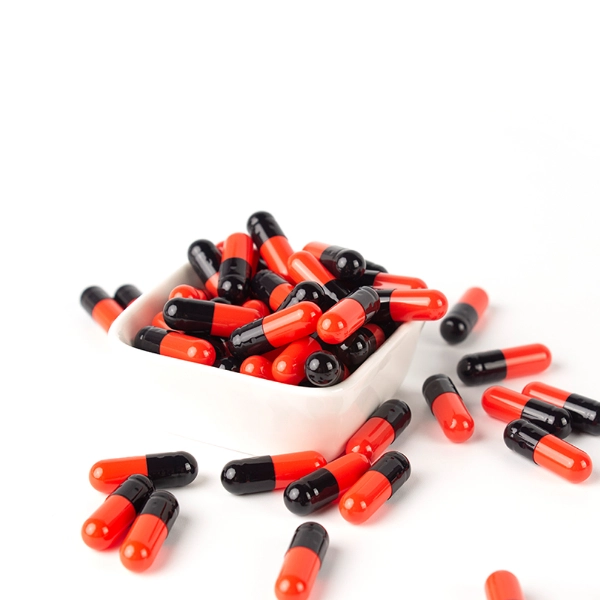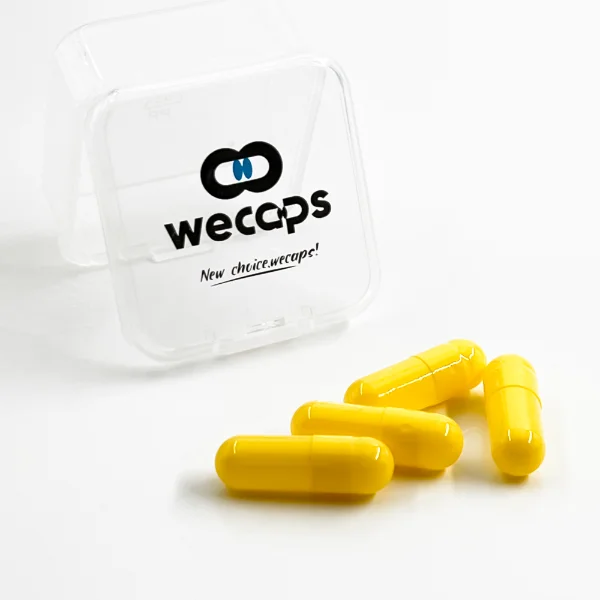Advantages of Enteric Coated Gelatin Capsules
Article source:Wecaps Aug 06, 2024 911
Enteric coated gelatin capsules combine the protective properties of enteric coatings with the versatility and biocompatibility of gelatin capsules. In this blog post, Wecaps will share the advantages of enteric coated gelatin capsules for sale and their importance in modern pharmacy.
Composition and Mechanism of Action
Enteric coatings are specially designed polymers that remain intact in the acidic pH of the stomach (typically around pH 1.5 to 3.5) but dissolve in the higher pH environment of the small intestine (pH 5.5 and above). Common materials used for enteric coatings include cellulose acetate phthalate (CAP), polyvinyl acetate phthalate (PVAP), hydroxypropyl methylcellulose phthalate (HPMCP), and methacrylic acid copolymers. These polymers are selected based on their solubility profiles and compatibility with the active pharmaceutical ingredient (API).
Gelatin capsules, on the other hand, are made from gelatin—a protein derived from collagen, typically sourced from bovine origins. Gelatin is chosen for its biocompatibility, ability to form a gel-like structure, and ease of digestion once it reaches the gastrointestinal tract. When coated with an enteric layer, the gelatin capsule is shielded from the acidic gastric environment, allowing the capsule to pass through the stomach intact. Upon reaching the more neutral or slightly alkaline pH of the small intestine, the enteric coating dissolves, releasing the contents of the capsule.

Protection of Acid-Sensitive APIs
One of the primary advantages of enteric-coated gelatin capsules is their ability to protect acid-sensitive APIs. Many drugs, particularly biologics and peptides, are prone to degradation in the acidic environment of the stomach. For instance, proton pump inhibitors (PPIs) like omeprazole are highly susceptible to degradation by stomach acid, rendering them ineffective if released prematurely. Enteric-coated gelatin capsules ensure that such APIs are not exposed to the stomach's acidic conditions, preserving their stability and bioavailability.
Furthermore, certain probiotics, which are increasingly being used in therapeutic applications, require protection from stomach acid to maintain their viability. The enteric coating prevents the destruction of these beneficial bacteria, ensuring that they reach the intestines, where they can exert their therapeutic effects.
Reduction of Gastric Irritation
Some medications can cause irritation or damage to the gastric mucosa when released in the stomach. Nonsteroidal anti-inflammatory drugs (NSAIDs), such as aspirin and ibuprofen, are well-known for their potential to cause gastric irritation, leading to ulcers or bleeding in severe cases. Enteric-coated gelatin capsules can mitigate this risk by delaying the release of these drugs until they reach the small intestine, where they are less likely to cause harm to the mucosal lining.
This property is particularly beneficial for patients who require long-term NSAID therapy, as it reduces the incidence of gastrointestinal side effects. Additionally, enteric-coated formulations are crucial for drugs with a narrow therapeutic index, where precise control over the release site is essential to avoid adverse effects.
Targeted Drug Delivery
Enteric-coated gelatin capsules are instrumental in achieving targeted drug delivery, particularly to the small intestine or colon. This targeted delivery is beneficial for treating conditions localized to these regions, such as Crohn's disease, ulcerative colitis, and certain infections.
For example, drugs like mesalamine, used in the treatment of inflammatory bowel disease (IBD), require release in the intestines to be effective. An enteric-coated gelatin capsule ensures that the drug bypasses the stomach and is released precisely where it is needed, maximizing therapeutic efficacy and minimizing systemic side effects.
Moreover, targeted delivery can enhance the absorption of certain drugs. The small intestine is the primary site for the absorption of most orally administered medications, thanks to its large surface area and rich blood supply. By ensuring that the drug is released in this region, enteric-coated capsules can improve bioavailability and enhance the drug's overall effectiveness.

Enhanced Patient Compliance
Patient compliance is a critical factor in the success of any therapeutic regimen. Enteric-coated gelatin capsules contribute to improved compliance by offering several patient-friendly features. Firstly, by reducing the incidence of gastric irritation and protecting acid-sensitive drugs, these capsules make it easier for patients to tolerate their medications, particularly those on long-term therapy.
Additionally, enteric-coated capsules can mask the unpleasant taste or odor of certain medications, which is a common complaint among patients taking oral drugs. The coating prevents the capsule contents from dissolving in the mouth, making the medication more palatable and acceptable to patients, particularly children and the elderly.
Moreover, the ability to encapsulate a wide range of APIs, including those with complex release profiles, in a single dosage form simplifies medication regimens. Patients are less likely to miss doses or take their medications incorrectly when they can take one enteric-coated capsule instead of multiple pills with varying instructions.
Stability and Shelf Life
Enteric-coated gelatin capsules also offer advantages in terms of drug stability and shelf life. The enteric coating provides an additional barrier against environmental factors such as moisture, light, and oxygen, which can degrade sensitive APIs. This enhanced protection is particularly important for drugs that are hygroscopic or prone to oxidation.
Furthermore, the gelatin capsule itself offers a degree of protection to the encapsulated drug, particularly when compared to tablet formulations. Gelatin's ability to form a tight seal around the API helps prevent exposure to air and moisture, further enhancing the stability and longevity of the drug.
Versatility in Formulation
The versatility of enteric-coated gelatin capsules is another significant advantage. These capsules can be used to deliver a wide range of APIs, including solids, semi-solids, and liquids. This flexibility makes them suitable for a variety of drug classes, from small molecule drugs to large biologics and nutraceuticals.
Enteric-coated gelatin capsules can also accommodate modified-release formulations, such as delayed-release or sustained-release profiles. This adaptability is particularly valuable in the development of combination therapies, where multiple drugs with different release requirements can be encapsulated in a single dosage form.
Additionally, the enteric coating can be customized to achieve specific release profiles, depending on the desired site of action. By selecting different polymers or modifying the thickness of the coating, formulators can tailor the dissolution characteristics of the capsule to meet the therapeutic needs of the patient.





